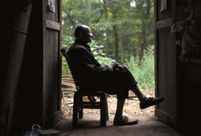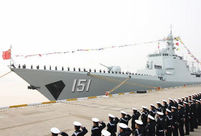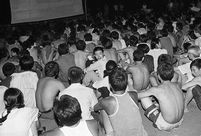 'Jin' named the word of the year by cross-strait netizens
'Jin' named the word of the year by cross-strait netizens Chinese scientific expedition goes to build new Antarctica station
Chinese scientific expedition goes to build new Antarctica station
 Chinese naval escort fleet conducts replenishment in Indian Ocean
Chinese naval escort fleet conducts replenishment in Indian Ocean 17th joint patrol of Mekong River to start
17th joint patrol of Mekong River to start China's moon rover, lander photograph each other
China's moon rover, lander photograph each other Teaming up against polluters
Teaming up against polluters
On December 26 2013, on the threshold of a new year, Japanese Prime Minister Shinzo Abe managed to turn back the clock by paying homage at the Yasukuni shrine, in the eyes of most Asian countries a symbol of Asian Nazism/Fascism.
The Fascist aggression left an indelible mark as one of the darkest periods in human history. The world has witnessed two strikingly different ways to reflect upon this ugly past.
43 years ago, the world watched with respect as the German Chancellor Willy Brandt solemnly went down on his knees before a monument to Jewish victims at the Warsaw Ghetto.
43 years later, the world saw Japanese Prime Minister Shinzo Abe in a different light as he made his high profile visit to the Yasukuni war shrine. Mr. Abe claimed that he was there to "pay his respects to the war dead who sacrificed their precious lives". However, one can hardly be expected to forget that among the war dead who made this 'sacrifice' were Tojo Hideki, the counterpart of Hitler and Mussolini in Asia, Kenji Doihara, major force behind the Manchukuo, the puppet state created by Japan during its occupation of northeastern China, and Iwane Matsui, principal culprit of the Nanjing Massacre.
Mr. Brandt himself was in exile fighting against fascism during the Second World War and he had no personal cause to kneel down. However, he insisted on doing so on behalf of all those who should have done but did not. Brandt's gesture of repentance and apology was followed in 1995 by the then sitting German Chancellor Kohl, who went down on his knees before the monument commemorating Jewish victims on his visit to Israel.
The grandson of Kishi Nobusuke, a World War II Class A criminal, Mr. Abe proclaims unabashedly that he has inherited most of his political DNA from his ancestor.
Abe is not alone in his veneration of eastern Nazis. Many seats in Abe's cabinet are occupied by right wing politicians, including Deputy Prime Minister Taro Aso, who publicly suggested that Japan should learn from Nazi Germany and revise its Constitution by stealth. No government with any sense of shame would have tolerated such a remark, but under the protection of Mr. Abe, Aso escaped any repercussions without so much as an apology.
2013 marked the 80th anniversary of Hitler's ascent to power. In a podcast on her website days ahead of the anniversary, German Chancellor Merkel reiterated that Germany has an everlasting responsibility for Nazi crimes. "We are facing our history, we are not hiding anything, we are not repressing anything. We must confront this to make sure we are a good and trustworthy partner in the future, as we already are today, thankfully," she said.
2013 also marked the 76th anniversary of the full scale Japanese invasion of China. When asked to comment on that period of history on the anniversary of the Marco Polo Bridge Incident, Prime Minister Abe answered that Japan also had a proud history that its neighboring countries should respect, leaving his sense of morality and honor open to question.
At that moment when Brandt went down on his knees, the spirit of the German nation stood up, and Germany confirmed that it was committed to an era of cooperation with the countries of Europe and with other parts of the world, winning respect and trust from the international community. In 2003 Brandt himself was ranked 5th in a vote conducted by German public television network ZDF for the greatest Germans of all time.
The moment Abe walked into Yasukuni shrine on a pilgrimage to honor his country's war criminals, he degraded himself to a political clown with a distorted vision of history, trampling on the feelings of all the peoples from Japan's victims of the Second World War.
German government spokesman Steffen Seibert asserted on December 30 that "all nations must honestly live up to their role in the horrific events of the 20th century. Only on the basis of this honest accounting is it possible to build a future with former foes." The truth of this statement is self-evident. Without such honesty, it will be impossible for Japan to build a future with its neighbors. The country risks being led up a cul de sac by the Abe administration.
 Chinese Consulate General in S.F. burned for arson attack
Chinese Consulate General in S.F. burned for arson attack Roar of J-15 fighter is melody for operator on the Liaoning
Roar of J-15 fighter is melody for operator on the Liaoning A 90-year-old forester's four decades
A 90-year-old forester's four decades Most touching moments in 2013
Most touching moments in 2013 2013: Joys and sorrows of world politicians
2013: Joys and sorrows of world politicians Missile destroyer Zhengzhou commissioned to Chinese navy
Missile destroyer Zhengzhou commissioned to Chinese navy China is technically ready to explore Mars
China is technically ready to explore Mars Photo story: Life changed by mobile technology
Photo story: Life changed by mobile technology Bullet train attendants' Christmas Eve
Bullet train attendants' Christmas Eve Cindy attends commercial event with her parents
Cindy attends commercial event with her parents 'Red Army' division conducts winter training in N China
'Red Army' division conducts winter training in N China  Harbin Int'l Ice and Snow Festival opens
Harbin Int'l Ice and Snow Festival opens  Cradle of high-speed train CRH380A
Cradle of high-speed train CRH380A  Most touching moments in 2013
Most touching moments in 2013 Chinese helicopter saves 52 in Antarctica
Chinese helicopter saves 52 in AntarcticaDay|Week|Month